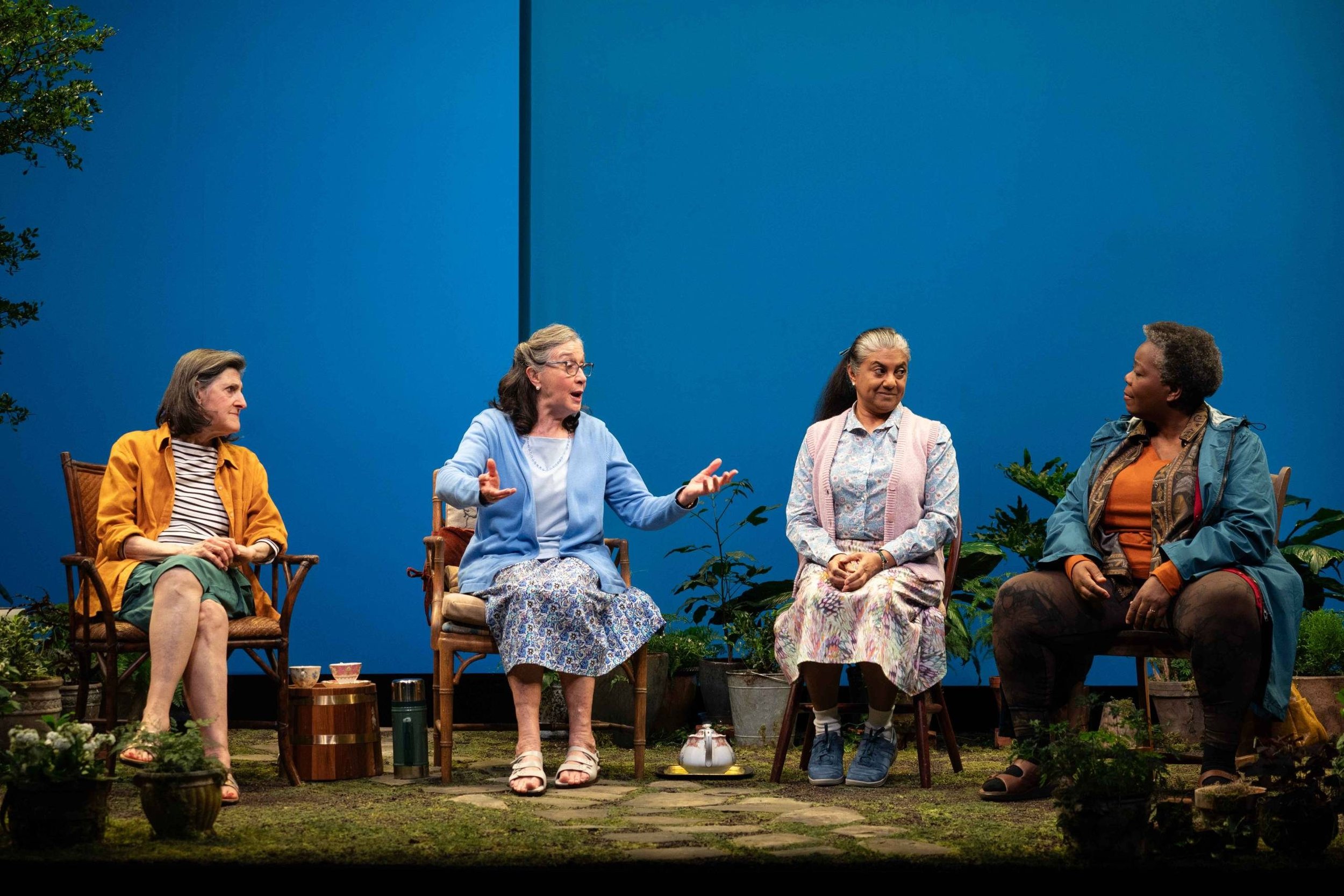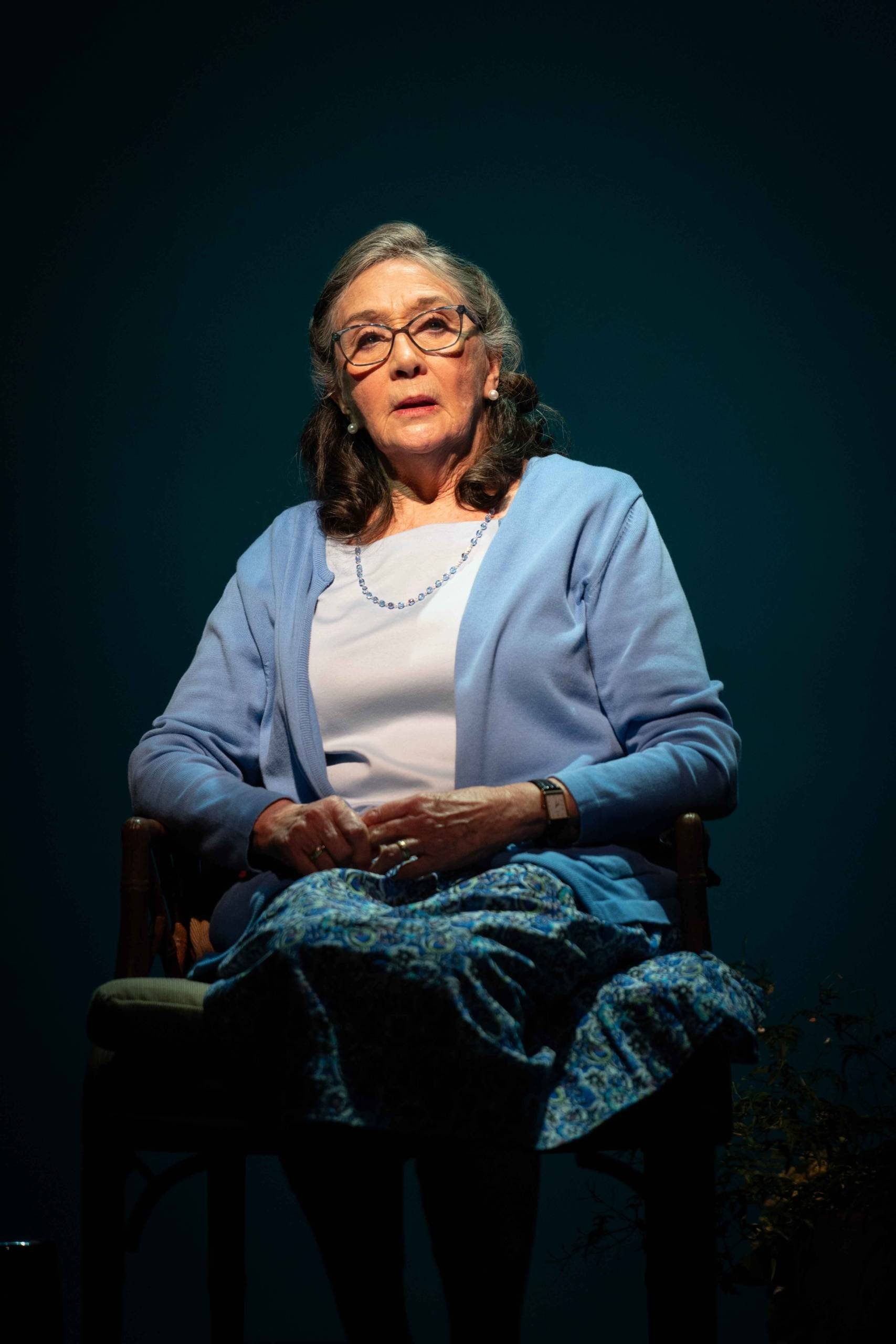Review of Escaped Alone, Yale Repertory Theatre
Much like Samuel Beckett before her, Caryl Churchill’s plays are anything but naturalistic dramas. Their theatricality is generally provocative, compelling, and oftentimes comical or at least quizzical. Such is the case with Escaped Alone, directed by Liz Diamond at Yale Repertory Theatre through March 30.
Vi (Mary Lou Rosato), Sally (Sandra Shipley), Lena (Rita Wolf), Mrs, Jarrett (LaTonya Borsay) in Caryl Churchill’s Escaped Alone at Yale Repertory Theatre (photo by Joan Marcus)
The cast consists of four women who have attained senior citizen status; Sally (Sandra Shipley), Vi (Mary Lou Rosato), and Lena (Rita Wolf) are visiting together in Sally’s garden when Mrs. Jarrett (LaTonya Borsay), a local women whom the others recognize but don’t really know, happens by. Mrs. Jarrett opens the play by addressing the audience and will close it the same way; her abrupt departure seeming to illustrate the play’s title phrase (a quotation from the Bible’s Book of Job that Herman Melville famously pressed into service in Moby-Dick): “I only am escaped alone to tell thee.”
In Job, the statement is made four times by four different messengers who tell Job of great calamities that have befallen his family and his livestock and his servants. In Churchill’s play, Mrs. Jarrett, suddenly separate from the rest, at regular intervals proclaims a litany of crisis and devastation that the playbill calls “graphic descriptions of human and environmental apocalypse." They are that, but they are also grotesque and carnivalesque and absurdist descriptions: “The hunger began when eighty percent of food was diverted to TV programmes” [. . .] “Only when cooking shows were overtaken by sex with football teams did ingredients trickle back to the shops and rice was airlifted again.” What we hear is a welter of emergency scenarios that, it may well be, we are poised more readily to take seriously than when Churchill’s play first debuted in 2016.
Mrs. Jarrett (LaTonya Borsay) in Caryl Churchill’s Escaped Alone at Yale Repertory Theatre (photo by Joan Marcus)
Each time we step out of that quiet, very English garden into Mrs. Jarrett’s flights (whether of fantasy or witness or prophecy we are never altogether sure) we are met first with a booming sound and blinding lights illuminating the audience. The device certainly creates tension, but undermines what I feel certain are meant to be comical elements in Mrs. Jarrett’s speeches. In Diamond’s production, LaTonya Borsay’s delivery has an almost unvarying pitch of barely suppressed panic. But even panic can become monotonous, and that may well be why the paucity of our imaginations is nowhere more pertinent than in the previsioning of apocalyptic scenarios. Churchill’s are richer than the norm but you’ll really have to concentrate to perceive her throughlines.
Within the garden, conversation moves agreeably amidst a range of topics, mostly small talk that serves to orient Mrs. Jarrett within the longstanding rapport of the other three, which allows them to speak in half-phrases and asides and addendums. The orchestration of the dialogue is brilliantly handled throughout. The play runs for under an hour, but you may find you would like to visit with these amiable women for much longer.
There are comments about grandchildren, former occupations, getting out of the house (or not), and acute observations (such as how neighboring countries are more likely to be antagonistic). The interplay of topics can sometimes put one or another on the spot, as when Sally talks about her testimony on behalf of Vi, when the latter was accused of murdering her husband. Such matters crop up with a comical matter-of-factness that is also speculative, as if the settled nature of these routine lives can be quite easily disrupted by a word or two too wide or too pointed.
And that of course is how these cursory topics relate to Mrs. Jarrett’s speeches, Churchill providing a verbal barrage that shows how we chatter upon a precipice and how hard it is to make speech work for us as more than directed sounds, as Lena puts it: “why move your mouth and do talking?”
Sally (Sandra Shipley) in Caryl Churchill’s Escaped Alone at Yale Repertory Theatre (photo by Joan Marcus)
Each character gets a telling spotlit moment, seated in her chair and letting us into her inner thought. For Lena, it’s how she easily withdraws from social expectations; for Vi, how she can’t bear a kitchen since that’s where her husband died; for Sally, a phobia about cats that mounts into a panicked need for someone who can make the fear go away; for Mrs. Jarrett, the single phrase “terrible rage” that—with Mrs. Jarrett played by a Black actress in this production—lands with more force than perhaps Churchill envisioned.
The resiliency of the quartet is nowhere better expressed than when they sing and dance together through a rendition of Ray Charles’ “Hit the Road, Jack,” a familiar, catchy tune that expresses an exuberance, not of escape but of assertion, as an “old woman” is addressed who is throwing a man out. It’s the most together these neighbors get and the musical number brings with it a sense of joyous renewal, as if their lives are still their own despite everything.
Vi (Mary Lou Rosato), Sally (Sandra Shipley), Lena (Rita Wolf), Mrs, Jarrett (LaTonya Borsay) in Caryl Churchill’s Escaped Alone at Yale Repertory Theatre (photo by Joan Marcus)
Lia Tubiana’s set suggests a placid world of green things bathed in Stephen Strawbridge’s day-bright lighting. Behind this garden scene stretch two huge screens that swirl and pulse with Shawn Lovell-Boyle’s projections—fire, lava, crepuscular life—during Mrs. Jarrett’s solo speeches, and depict clouds as if a time-lapse film later in the play. Costumes by Yu-Jung Shen are relaxed and colorful, with sneakers or sandals and cardigans. If at first we feel we’re calling with Mrs. Jarrett on a group of homebodies passing time, by the end we might feel we’ve stumbled on the Three Fates, speaking of “what’s past or passing or to come.”
Escaped Alone
By Caryl Churchill
Directed by Liz Diamond
Scenic Designer: Lia Tubiana; Costume Designer: Yu-Jung Shen; Lighting Designer: Stephen Strawbridge; Sound Designer: Sinan Refik Zafar; Projection Designer: Shawn Lovell-Boyle; Music Director: Liam Bellman-Sharpe; Hair Designer: Matthew Armentrout; Production Dramaturgs: Catherine Sheehy, Karoline Vielemeyer; Technical Director: Keira Jacobs; Vocal and Dialect Coach: Julie Foh; Casting Director: Calleri Jensen Davis; Stage Manager: Charlie Lovejoy
Cast: LaTonya Borsay, Mary Lou Rosato, Sandra Shipley, Rita Wolf
Yale Repertory Theatre
March 8-30, 2024



